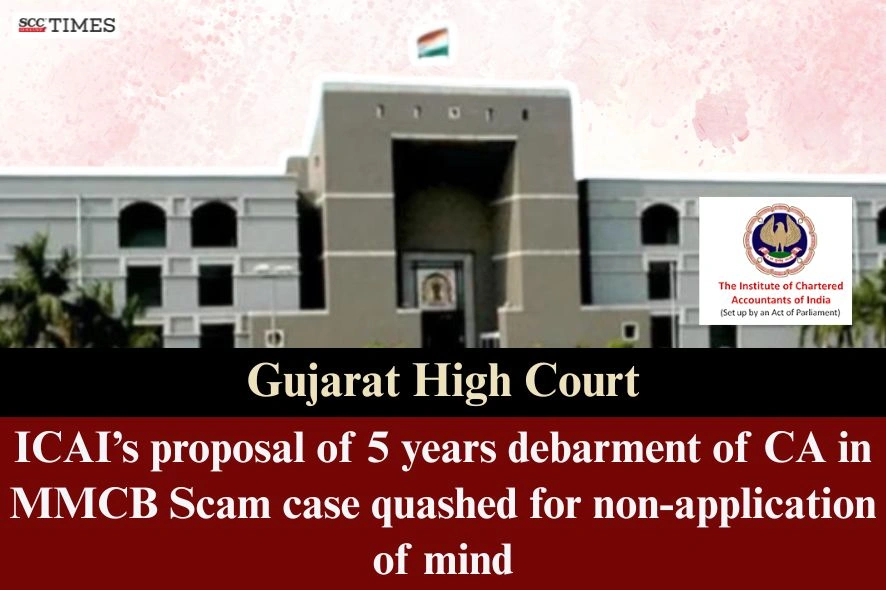Disclaimer: This has been reported after the availability of the order of the Court and not on media reports so as to give an accurate report to our readers.
Gujarat High Court: In a reference under Section 21(5) of the Chartered Accountants Act, 1949 (‘Act’) concerning allegations of professional misconduct against Chartered Accountant S.N. Valera, a Division Bench of *A.S. Supehia and Pranav Trivedi, JJ., set aside the recommendation of the Institute of Chartered Accountants of India (ICAI) to remove the respondent’s name from the Register of Members for five years. The Court held that the Council had failed to record independent findings as mandated by the Act and the Chartered Accountant Regulations, 1988 (‘Regulations’), and had instead reproduced the Disciplinary Committee’s report verbatim without adequate consideration of the respondent’s representation.
Background
The instant proceedings arose out of the Madhavpura Mercantile Cooperative Bank (MMCB) scam of 2001. The respondent, who had been appointed as an auditor of MMCB for the Financial Year 1999—2000, had been accused of failing to report serious irregularities detected during a subsequent re-audit ordered by the Registrar. It was alleged that he neglected to disclose material misstatements known to him in the financial statements and had thereby shown gross negligence in the discharge of his professional duties.
On the basis of a complaint lodged in 2002, the matter was referred to the Disciplinary Committee which framed sixteen charges. After inquiry, the respondent had been held guilty of eight charges, related principally to irregularities in sanctioning loans, advances in violation of Reserve Bank of India directives, and absence of adequate verification. The Committee submitted its report on 16 November 2004. The respondent filed a detailed written representation before the Council and was also heard through counsel.
The Council had accepted the Committee’s conclusion on guilt and in 2005, recommend to the High Court that the respondent be removed from the Register of Members for a period of five years.
Analysis, Law and Decision
The Court began by examining the statutory scheme under Section 21 of the Act read with Regulation 16 of the Regulations. The Court noted that the disciplinary process is designed as a multi-layered mechanism:
-
the Committee conducts a fact-finding inquiry, and
-
considers the Committee’s report along with the member’s written representation and record its own independent finding.
The Court noted that the expression ‘shall record a finding’ in Section 21(3) and the mandate in Regulation 16(4) require a reasoned decision that demonstrates application of mind. Mere concurrence with the Committee’s conclusions, without addressing the member’s submissions, does not satisfy this statutory obligation.
The Court noted that in cases of misconduct by a CA, Section 21 and Regulation 16 provide a four-tier exercise to be undertaken which is as follows:
-
Prima facie opinion under Section 21(1) by the Council;
-
Preparation of report by the disciplinary authority;
-
Findings of Council on the disciplinary committee’s report and representation of the member; and
-
Consideration of recommendation sent by Council along with report by the High Court in case the member is recommended to be removed from the Register for more than five years or permanently.
The Court referred to the case of Anand Brothers P. Ltd. v. Union of India, (2014) 9 SCC 212, wherein the Supreme Court had discussed the meaning of the word ‘finding’. According to the Supreme Court, a legal conclusion qualifies as ‘finding’ only when it is supported by stated reasons. The correctness of these reasons is immaterial as a reasoned conclusion, even if fundamentally flawed, still constitutes a ‘finding’ albeit an erroneous one. Essentially, a finding requires an application of mind which is most effectively demonstrated by disclosing the underlying reasoning.
Applying these principles, the Court found the Council’s report gravely deficient. The report ran extensively by reproducing the Disciplinary Committee’s findings verbatim, while the Council’s ‘finding’ itself was confined to a brief paragraph stating that it had considered the written representations and oral submissions and accepted the Committee’s report. The Court noted that no discussion of the respondent’s representation was found in the report, nor any indication that the Council had evaluated the defence put forth. The omission to deal with the respondent’s submissions, coupled with the virtually identical verbatim reproduction of the Committee’s report, was held to exhibit a complete lack of independent application of mind.
Therefore, the Court held that the Council’s recommendation failed to meet the statutory requirements and principles of natural justice and was therefore liable to be set aside.
[Council of Institute of Chartered Accountant of India v. S. N. Valera, 2025 SCC OnLine Guj 4888, decided on 19-11-2025]
*Judgment Authored by: Justice A.S. Supehia
Advocates who appeared in this case:
For the Applicant: B.S. Soparkar, Swati Soparkar, Advocates
For the Respondent: Megha Jani, Arjun M. Joshi, Advocates


